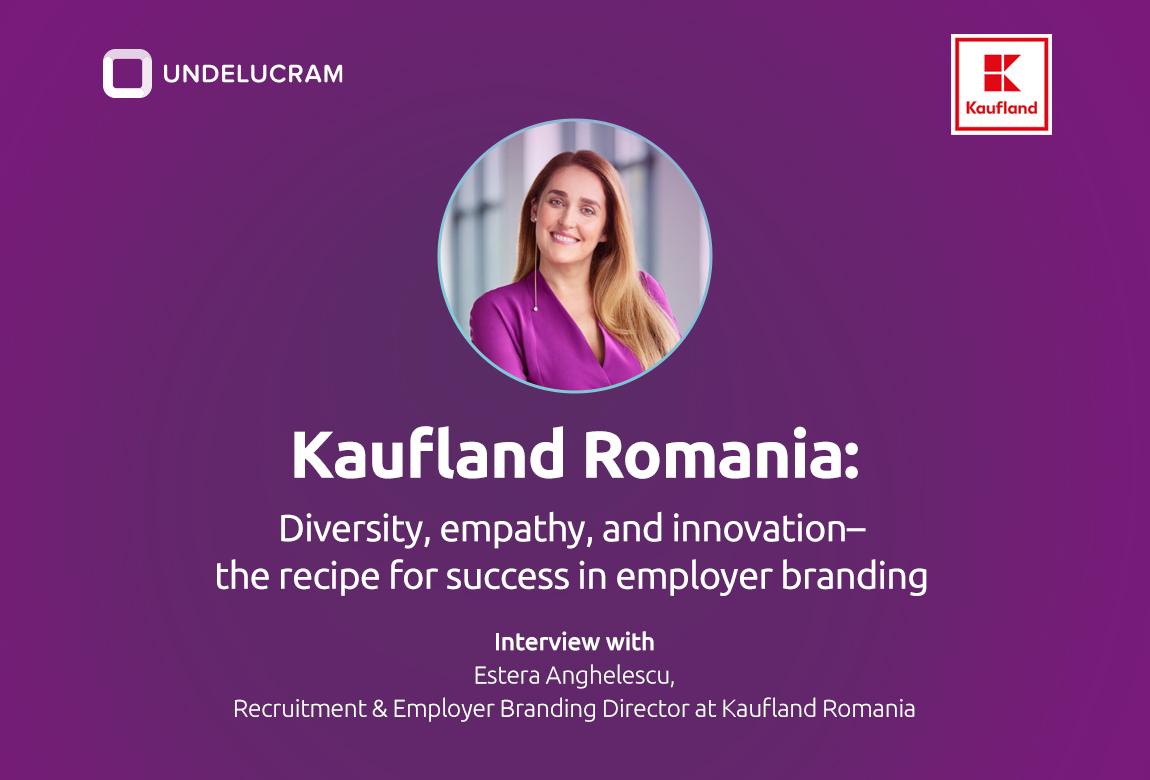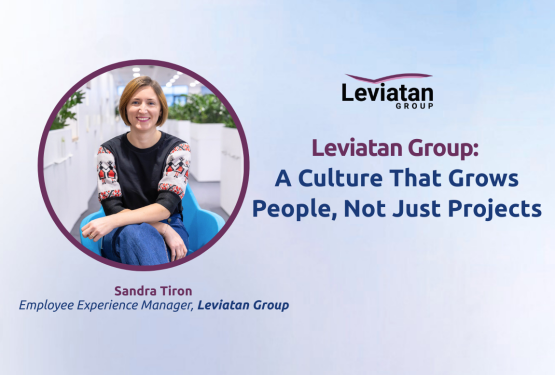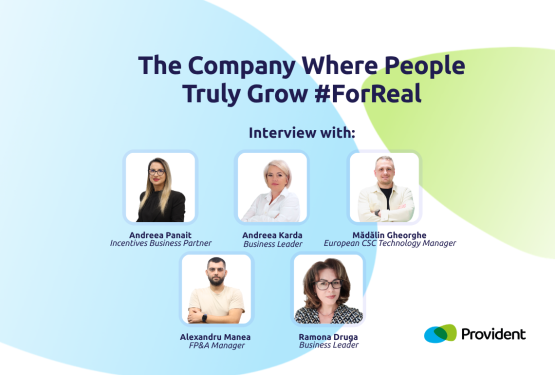Share
Kaufland Romania: Diversity, Empathy, and innovation – the recipe for success in employer branding

Today, we kick off a series of interviews with professionals from companies featured in the Top 100 Employers Undelucram.ro. Just weeks before the Top Employers Conference Undelucram.ro, we aim to spotlight some of Romania's most appreciated employers and their HR experts who will participate in the event.
This time, we highlight Kaufland Romania, ranked second in the Food Retail category. We wanted to uncover the essential elements that make it a sought-after employer in the job market. To do so, we spoke with Estera Anghelescu, Recruitment & Employer Branding Director, for an insider’s perspective on the company.
With over 20 years of experience, Estera leads the ACCES program—Hiring Candidates with Special Needs at Kaufland—and also serves as Vice President of the RDCC. Over the years, she has been recognized as Global Employer Brand Leader of the Year by Kantar and Employer Branding Professional of the Year by Evensys. Her passion for innovation and continuous development has also led her to take courses at MIT, Stanford, and the University of North Carolina.
Discover some of the best practices Estera and her HR team use to align employees with organizational values.
1. What aspects of the company’s work environment do you think are most appreciated by employees and future candidates?
Despite the company’s size and diversity—ranging from workplaces such as stores, warehouses, and head offices to a national footprint—there are common elements that define Kaufland’s work environment. These include the diversity of people and activities, open communication, energy and efficiency, and collaboration. This diversity is a major attraction point for both our employees and candidates, who value varied opportunities such as part-time roles, diverse positions, and activities that promote continuous learning.
2. How do you build an employer brand that attracts the right talent for your company?
Kaufland’s employer brand is defined and built together with our team members. They bring authenticity to the brand, transforming it into a true reflection of our values and organizational culture. As a recruitment and employer branding team, our role is to centralize feedback, craft messages that genuinely represent the company’s spirit, and choose the most effective communication channels.
Building a strong employer brand takes time, constant validation through employee feedback, and demonstrated attractiveness to candidates. It’s an ongoing effort that continues as long as the organization remains active. We chose to develop this brand alongside our team, listening to the needs and expectations of both colleagues and candidates.
While the core of an employer brand develops from within, our responsibility also includes constantly monitoring market trends, candidate expectations, and the broader evolution of the workplace. Our goal is to remain an attractive employer for future candidates and a reliable choice for our current employees. Efforts to attract clients are reflected in strategies to attract candidates, and ongoing adaptation to market dynamics is essential. In recent years, the pace of these changes has accelerated significantly, but the essence of a strong employer brand remains the same: people.
3. How do you see the impact of leadership on attracting and retaining talent in the context of Romania’s labor market?
For many years, it has been evident that leadership is no longer about imposing rules and supervising teams. Instead, it’s about empathy, open communication, aligning with the diverse needs of people, and leading by example.
In short, people no longer want to work with managers who lack empathy, openness, understanding, and humanity. This criterion often outweighs financial benefits, which is natural given the amount of time we spend at work. Employees seek to work with individuals they can learn from, who support them, with whom they can build trust, and with whom they identify. Poorly reputed management cannot attract or build successful teams, regardless of efforts in other areas, such as promotion. Romania’s labor market has long aligned with international trends in this regard.
In addition to promoting a culture of open communication and collaboration at all company levels, we constantly invest in special initiatives that support these principles. Programs like “In the CEO’s Shoes,” “CEO Breakfast,” team-building activities, and joint volunteer efforts bring operational employees face-to-face—or even side-by-side—with top management. These activities aim to reduce hierarchical barriers through direct collaboration, authentic dialogue, and shared experiences.
4. What measures do you implement to keep Kaufland competitive in Romania’s labor market and attractive to candidates, given current trends?
Our measures range from flexible benefit packages tailored to the diverse needs of different employee groups to programs that include flexible work options, adapted workplaces, and optional team activities such as volunteering or team-building events. These initiatives have evolved over time alongside changes in the labor market and employee and candidate expectations.
Given our large team, composed of individuals with varying needs and priorities, we know that a one-size-fits-all approach cannot address this diversity. That’s why we focus on creating personalized packages that meet the needs of distinct employee groups. At the same time, our company’s diversity—reflected in the variety of departments, activities, and locations—is a crucial advantage. This allows us to offer diverse opportunities so that every candidate can find a role that suits their level of experience, desired flexibility, work schedule, or preferred location.
5. What initiatives or projects have you led that have had the greatest impact on the organization?
Over my 20 years with Kaufland, I’ve had the opportunity to lead numerous projects that have shaped the company’s development. From the first employer branding project—a first on the local market—to establishing a dedicated employer branding department, I’ve contributed to building a solid foundation for talent attraction and retention. Employer branding campaigns and activations, such as those held at music festivals, were also market firsts and have strengthened Kaufland’s position as an attractive employer.
Another example is the development of initiatives with significant social impact, such as the ACCES program, dedicated to integrating people with disabilities into the workforce. Additionally, projects targeting Generation Z, with a focus on innovation and technology—like Jobidon—have stood out both locally and internationally. Each of these initiatives has contributed to building a strong employer brand, attracting talent from diverse groups (Generation Z, people with disabilities, retail workers, etc.), and developing the Kaufland team, directly impacting the company’s growth and success.
6. What important lessons have you learned in your career, and how do you apply them in your daily work?
Throughout my career, I’ve learned many valuable lessons, but a few stand out as particularly important. While they may seem common, experience has taught me their true significance:
1. You can’t build far alone. A trust-based team is essential for success. Interpersonal relationships are the foundation of a prosperous business, regardless of the product or service offered.
2. Perfectionism can be a hindrance. It’s better to experiment, fail, or do something well than to do nothing at all for fear of imperfection. Sometimes, progress is more valuable than perfection.
3. Planning and flexibility go hand in hand. Analysis and planning are essential for setting direction, but the final outcome often differs from the initial plan. Flexibility and adaptability are key to completing projects and avoiding disappointments and frustrations.
4. The courage to try and fail is crucial. For example, the ACCES program wouldn’t have launched if we had focused solely on what was missing at the time. It’s important to start even if all conditions aren’t ideal.
5. Ask for help when you need it. Vulnerability and openness can pleasantly surprise you. People are more willing to help than you might think if you give them the chance.
These lessons continue to guide me every day through every human interaction I have. They help me improve my approach and contribute significantly to the team’s and the company’s success.
7. How do you support the professional development of your team members?
As with our benefit packages, which address the diverse needs of various employee groups, this principle also applies to professional development. The first step in supporting the team is listening to them, understanding the direction they wish to grow, and providing support on this journey. I’m aware that people need change and growth, which can happen even within the same role, team, or department. This flexibility and the possibility of continuous learning are actually the reasons I’ve stayed at Kaufland for 20 years without ever feeling stagnant.
Beyond professional development courses, there are many other ways people can grow:
- Adapting roles and activities to allow them to explore new responsibilities.
- A rotation system that enables involvement in different projects within the same or other departments.
- Shadowing, which allows them to learn directly from their colleagues.
- Participating in external activities such as workshops, conferences, or training sessions.
At an organizational level, we have a dedicated Training and Development department that offers employees a wide range of courses and professional training. Additionally, activities such as volunteering hours in CSR-organized programs contribute to both personal and professional development.
8. How do you identify and leverage each team member’s strengths to maximize their impact on overall performance?
The first step is open communication and continuous feedback. While we have periodic evaluations to summarize each employee’s progress at set intervals, we don’t wait for these moments to identify strengths or areas where employees want to develop. Managers play a crucial role in this process, staying close to their team members to discover their potential, even when it’s not fully recognized by the employees themselves.
Given the company’s large size and the diversity of activities and departments, we offer development opportunities both horizontally, through involvement in new activities or projects, and vertically, through advancement into leadership positions or new specializations. If an employee expresses a desire to explore a particular field, we strive to facilitate this transition.
Through this continuous process of communication, support, and adaptation, we manage to leverage the strengths of each team member, contributing to the overall performance of the organization.
9. What key trends do you see shaping the labor market, and how does your company align its strategy to stay ahead?
We are in a period of continuous change, especially after the pandemic. What defines this stage is the accelerated pace of transformations. The adjustment period is becoming shorter, while the flow of information and technology continues to grow. As a result, many people feel overwhelmed by this fast pace.
In the business environment, pressures are felt both in terms of competitiveness and customer expectations, which have diversified significantly. Shopping experiences are now much more varied—in-store, online, or via home delivery—and these changes naturally influence the labor market as well.
Some of the key trends we observe:
- Flexible work schedules: This has become a norm, whether it’s hybrid, remote, or part-time work.
- Technology integration: More and more employee activities are influenced by new technologies, transforming both their responsibilities and the skills needed for success.
- Focus on social impact: Candidates are increasingly concerned with how organizations contribute to society, redefining employers’ roles—from providing jobs to providing meaning and contribution in people’s lives.
To remain competitive, Kaufland continuously adjusts its strategy, offering flexibility, developing technological competencies among employees, and placing strong emphasis on the social impact of our activities.
10. How do you maintain a balance between integrating new technologies and keeping a human-centered approach to workplace relationships?
The technologies we introduce aim to support employees’ work, not replace them. They are seen as tools that increase efficiency, simplify tasks, and improve processes.
When making significant changes, implementation happens gradually:
1. We pilot new solutions, monitor their impact, and adapt the process for optimal transition.
2. We ensure that every change is well understood and accepted by the team, so integration feels natural.
Moreover, technology is already a part of people’s everyday lives, so these changes align with the general pace of societal evolution.
People are at the center of all our activities, whether they are employees, customers, or partners. The technological solutions we introduce are carefully evaluated to ensure they bring real value—improving both employees’ work experiences and our customers’ experiences.
11. How does Kaufland support graduates in transitioning from education to the labor market? Are there specific initiatives or programs to facilitate this process?
Kaufland has a strong tradition of supporting young people in transitioning from education to the labor market through a wide range of programs dedicated to high school students, university students, and graduates. These include:
- Raftul cu Experiențe (“The Shelf with Experiences”): A program dedicated to high school students.
- Internship and Trainee Programs: Providing learning and professional integration opportunities.
Over time, we have developed partnerships with various educational institutions and student associations to promote career opportunities and support young people even during their studies. Some of our initiatives include:
- Offering workshops in schools and universities to provide students with practical skills.
- Simulated interviews to prepare them for real-world job market experiences.
- Part-time job opportunities that allow them to gain professional experience while studying.
In fact, many of our current colleagues started their journey at Kaufland through these programs, either during their studies or immediately after graduation.
12. What message would you send to candidates who might be interested in joining your team?
We warmly invite everyone who wants to join us to explore our job opportunities, discover our organizational culture, and learn about the values that define Kaufland. Choosing a job is an important step in every candidate’s life, and we want to work with motivated people who share our mission and values.
For any questions or curiosities, we encourage candidates to reach out to us on cariere.kaufland.ro or LinkedIn, where we’re always open to providing the information they need.
13. What key factors do you believe have contributed to the company’s recognition as a Top Employer, and how are these integrated into the company’s overall strategy?
Kaufland’s recognition as a Top Employer is the result of a combination of key factors, such as:
- A diverse benefits package tailored to the needs of various employee groups.
- The variety of roles and the flexibility offered, enabling employees to adapt their work schedules and choose departments based on their experience and interests.
- Professional development opportunities and the company’s openness to individuals from diverse backgrounds.
We are a well-recognized employer in the local market, continuously expanding, which makes our job offerings extremely diverse. This diversity is a central element of our strategy, reflected both in the range of jobs and in the product offerings in our stores.
By integrating these factors into the overall strategy, we ensure that we remain attuned to the needs and expectations of our employees, candidates, and customers. We will continue to invest in flexibility, diversity, and development to maintain our status as a Top Employer and meet market demands.
14. What role does leadership play in your company’s success as a Top Employer, and how is this reflected in your team development strategy?
Leadership plays a vital role in Kaufland’s success as a Top Employer, being present in both strategic decisions and direct involvement in team development. Personal example is critical, and leadership extends beyond hierarchy—including impactful initiatives from any employee, active involvement, and empathy and care for colleagues.
At the organizational level, all measures supporting team development require leadership backing. Leaders play a crucial role in creating a work environment based on trust, collaboration, and continuous growth, contributing to the company’s consolidated success.
Looking for a job in food retail?
Join one of the companies in the Top 100 Employers Undelucram.ro! Visit Kaufland’s company page on Undelucram.ro and explore the benefits of working at a company that values its people!
Share
What I read is worth it:
Read all the articles about
Undelucram interviews About the crafts Find your job Leadership concepts Workforce planning Organizational excellence Employee experience Employer branding Motivation and vocation Job opportunitiesArticle written by:
Comments
0 comments

Access your account and add your comment
Undelucram interviews
Subscribe to the Newsletter
Read articles of interest from Undelucram.ro contributors


